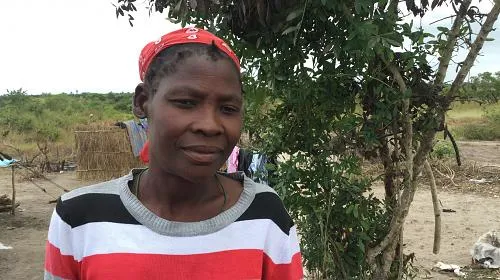BEIRA (May 28, 2019) – Ten weeks after Cyclone Idai struck southern African nations, communities in central Mozambique are still struggling to rebuild their lives. After entire villages were destroyed, many Mozambicans are still living in tents in displacement camps, or in improvised sheds that are not suitable for living.
“Cyclone Idai has left a level of increased poverty by close to 80 per cent and communities are still completely reliant on humanitarian assistance, but media attention has fallen down drastically,” says Marc Nosbach, CARE’s country director in Mozambique. “Without continued attention, humanitarian organizations like CARE will struggle to continue helping these communities overcome the impact of the cyclones. Addressing immediate needs is important, but what is as important is helping these communities recover completely. And we cannot talk about recovery without the secured funding from the international community.”
While Mozambique was struggling to overcome the first shocks of Cyclone Idai, the northern part of the country was hit by Cyclone Kenneth, stretching the nation’s resources even further.
This is the first time in Mozambique’s history to be hit by two cyclones in the same season. However, the UN’s appeal for Mozambique’s humanitarian response plan for 2019 has so far only been funded by 30 percent.
“The impact of climate change is no longer in the future, it has become a reality,” adds Nosbach. “While industrial, developed countries are contributing to these unusual weather patterns, the impact of this phenomenon is on the poorer, underdeveloped countries. As we need to continue supporting the heavily affected countries, such as Mozambique, taking serious steps towards reducing the impact of climate change is an urgent need, before similar weather disasters bring additional destruction to our world.”
Both cyclones came at a moment where farmers were expecting their harvest. The storms and the flooding they brought along have destroyed most of the crops. Families are already worried about not having enough food, which is expected to exacerbate in the coming months. Coupled with an ongoing drought in wide parts of the country’s southern provinces, Mozambique is expected to face a serious food emergency before the next harvest season in 2020.
“I had been building my own house, brick by brick, when the cyclone [Idai] reached us,” says Victoria Rosario, 46, who lives in a camp for displaced people after her village was entirely submerged by Cyclone Idai. “I had my own field and chickens that I was growing and selling. I saw everything being washed away before I had to climb a tree and stay there for two days waiting to be rescued. Now I am here with nothing. I don’t even have enough food for my children and myself.”
Along with the need for continued support for the affected communities, CARE urges donors and the international community to take into account the already existing vulnerabilities, particularly in terms of the already fragile infrastructure in most parts of the 64 districts that were directly affected by the cyclones. Moreover, CARE would like to take the opportunity to remind stakeholders of the importance to prioritize the particular needs of women and girls, as they are often neglected in natural disasters. Even when they have access to assistance, women often prioritize their families’ needs over their own.
About CARE’s work in Mozambique:
CARE has been working in Mozambique since 1984 delivering emergency and large-scale humanitarian response programs to communities affected by the civil war. After the end of the war in 1992, this has shifted into development-based programming until Cyclone Idai struck the country in March 2019, followed in April by Cyclone Kenneth. CARE assists communities affected by the two cyclones as part of the emergency consortium COSACA, providing food, water and sanitation, and shelter assistance, as well as building temporary classrooms in locations where schools have been destroyed, severely damaged, or used as temporary shelters for communities who have been displaced by cyclones.
About CARE:
Founded in 1945, CARE is a leading humanitarian organization fighting global poverty. CARE places special focus on working with poor girls and women because, equipped with the proper resources, they have the power to lift whole families and entire communities out of poverty. Last year, CARE worked in 94 countries and reached more than 80 million people around the world. To learn more, please visit: www.care.org.
For questions or media queries, please contact Mahmoud Shabeeb, CARE’s humanitarian communications manager, at Mahmoud.shabeeb@care.org, or by phone at +258865922475 (in Mozambique until June 1st.)

